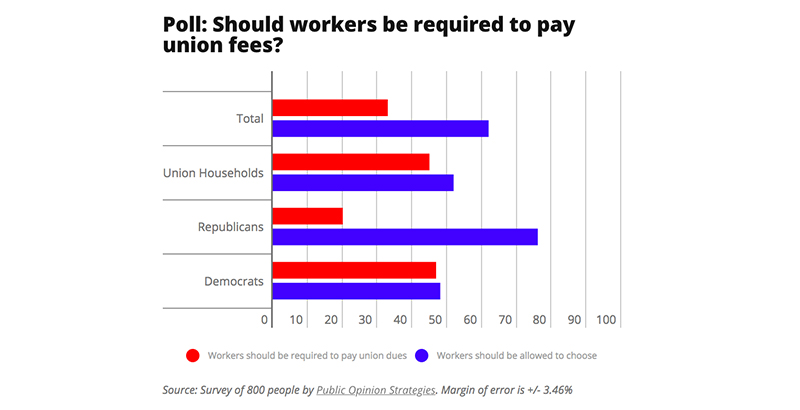In a 5-4 decision, the Supreme Court ruled against mandatory union agency fees, reflecting a recent survey of national public opinion on the issue.
In a poll conducted by Public Opinion Strategies, a firm used by many Republican organizations, nearly two-thirds of Americans said that union members shouldn’t have to pay mandatory union fees.
The majority opposition to the fees was consistent across race, gender, even members of union households. The one area it varied was by political party. While 76 percent of Republicans supported opting out of mandatory fees, Democrats were split, with 48 percent against mandatory fees and 47 percent in favor of choice.
Members of Conservative Leaders for Education — the group that commissioned the poll — applauded the court’s ruling.
“Public opinion is clearly on the side of the Supreme Court’s decision. Only a small percentage of people think it’s right for teachers to have their pay taken without their permission,” said the group’s president, Karen Nussle, in a statement. “Teachers, and all government workers, should have a choice, and exercising that choice should not put their jobs at risk.”
In its Janus ruling, the court said that the fees, which are used to fund collective bargaining and other shared benefits, were a violation of the First Amendment right to free speech for employees who don’t agree with their union’s policy.
“Neither an agency fee nor any other form of payment to a public-sector union may be deducted from an employee, nor may any other attempt be made to collect such a payment, unless the employee affirmatively consents to pay,” Justice Samuel Alito wrote for the court’s five-justice conservative majority. The ruling clarified that employees will have to opt into paying fees, a sharp departure from common practice now, when the burden is on dissenting members to opt out.
The ruling overturns a prior Supreme Court ruling, Abood, which in 1977 ruled that union members did not have to pay dues to support their union’s political activities but were still required to pay agency fees to prevent them from becoming “free riders.” The court this time around agreed with plaintiff Mark Janus, an Illinois state worker, that when dealing with public-sector unions it’s almost impossible to distinguish political action from advocacy done to protect compensation, pensions, and other conditions of collective bargaining.
Justice Elena Kagan wrote a dissenting opinion, criticizing the majority for overturning the precedent set in Abood.
“Its decision will have large-scale consequences,” Kagan wrote. “Public employee unions will lose a secure source of financial support. State and local governments that thought fair-share provisions furthered their interests will need to find new ways of managing their workforces.”
A 2017 Education Next poll also found that a majority of respondents — 44 percent — oppose the mandatory fees for teachers. But another poll, conducted by American Public Media Research Lab, found that public opinion was evenly split on the matter, with 45 percent of Americans supporting agency fees and 45 percent opposing.
Nearly 800 people were contacted by landline and cellphone for the poll, which had a margin of error of plus or minus 3.46 percent. Click here to see the complete breakdown of the questions and answers by respondent demographics.
Disclosure: The Charles and Lynn Schusterman Family Foundation provides financial support to Conservative Leaders for Education and The 74.
Get stories like these delivered straight to your inbox. Sign up for The 74 Newsletter


;)
